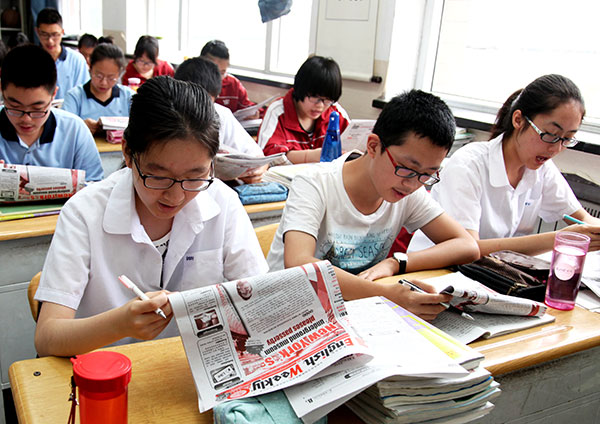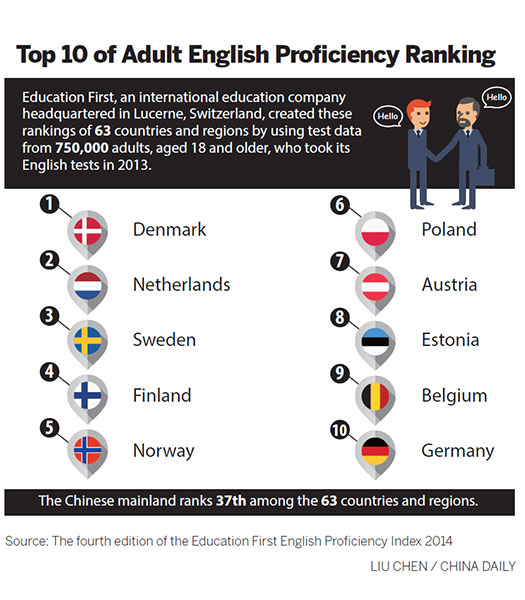Gaokao revamp to stress better English
Updated: 2015-07-03 07:14
By Tnag Yue(China Daily)
|
||||||||
|
 |
|
Students reading English Weekly at a senior high school in Taiyuan, the capital of Shaanxi province. Some editions garner more than 8 million readers a week, accounting for one-third of all children in China's senior high schools.[Photo by HAN Xuyang/ For China Daily] |
Since March, English Weekly has been working with the British Council Beijing, which operates as the Cultural and Education Section of the British Embassy, to prepare for the forthcoming reforms. They have invited experts from the UK to give personal tuition and online training related to designing tests to assess students' communication skills.
"Testing is all about making inferences about real-life performance based on test performance. A good test is one for which we can defend the inferences made," said Greg Selby, the British Council's director of examinations for East Asia.
Liu Yongjun, English Weekly's deputy editor-in-chief, said that has rarely been the case in the history of English education and testing in China. "There was even dialogue like 'Are you a boy', 'Yes, I am' in the test, something that would be obvious to any observer and not worth asking in the first place," Liu said, adding that the authenticity and contextualization of the tests have improved greatly over the years.
However, a serious problem with the gaokao as it currently stands is the low level of testing of comprehension and speaking skills because only a few provinces include a listening test in their exam, while speaking skills are only tested in Guangdong province, or if a student wants to major in foreign-language studies.
"Usually, when people say 'I know English', it means 'I can speak English', so it's kind of ironic that the most important component gets the least attention at the moment," said Jeff Stanford, an applied linguist at the University of Leicester in the UK who lectures on the training program.
Beyond learning
"It (the lack of speaking tests) is common around the world, because they are difficult to set up and extremely costly. But if there was one change that could be achieved in the college entrance exam, it would be to include the speaking component, even if you start with the minimum, just a few sentences, then it will grow," said the British national, who has worked at national English-testing centers in Tajikistan, Armenia and Lithuania.
On a positive note, as one of two chosen pilot regions for gaokao reform, Shanghai plans to include a speaking test from 2017.
When Stanford entered the English Weekly's classroom in March, the first thing he did was rearrange the desks, which had been set out in formal rows, into small, informal groups.
"One challenge posed by the teaching of communicative skills is that it asks students to be more responsible for their learning. From what I've read, teachers have a dominant role in the Chinese classroom and they are given so much respect," he said.
Although the changes have been officially mooted, Cao Yu, the English Weekly editor, warned students and teachers not to expect too much, too soon. Even though the reform is expected to drive the transformation of English-language education in China, the remaining bottlenecks the in classroom mean change won't happen overnight.
Cao worked as an English teacher at a senior high school in Yangquan, Shanxi province, between 1992-2005. She said the classes were large-one of them had about 80 students-which makes teachers' workloads far heavier than those shouldered by their counterparts in China's big cities and Western countries.
"It's impossible to give every student a chance to speak up in class, so teachers have to be really creative to ensure the students practice after school," she said.
However, when Cao was working at the chalkboard, not every teacher could speak good English, and she was only one of two teachers in her school who taught the students exclusively in English.
"But at least the English textbook has started to include more up-to-date information about the real world; it used to be all about small animals or historical figures like Karl Marx, but now there are facts about the prevention of HIV," the 46-year-old said.
Yang Huiying, another editor at English Weekly, was also eager to modernize the information provided to students, so in addition to simply using stories about the history of the Olympic Games when sports are featured in the paper, she sometimes also includes pieces about Western sports, such as baseball.
"It probably won't appear in the gaokao, but I think learning more about the culture of the English-speaking world will really help the students to communicate with native speakers and the outside world. After all, that's why we learn languages in the first place, isn't it?" she said.
Contact the writer at tangyue@chinadaily.com.cn

- Injured ROK tourists in intensive care
- 36 dead, 26 missing after banca capsized in C. Philippines
- Thai navy plans to buy three Chinese subs
- Mass casualties in Indonesian military plane crash
- Japan's LDP lawmaker denounces Abe's security policies
- More than 100 feared dead in Indonesian military plane crash

 Western Europe swelters in long-lasting heat wave
Western Europe swelters in long-lasting heat wave
 Top 10 shareholders of AIIB
Top 10 shareholders of AIIB
 Massive Hello Kitty theme park opens to visitors
Massive Hello Kitty theme park opens to visitors
 New terminal of Pyongyang Intl Airport put into use
New terminal of Pyongyang Intl Airport put into use
 Ten paintings to remember Xu Beihong
Ten paintings to remember Xu Beihong
 Obama hails new chapter in US-Brazil relations
Obama hails new chapter in US-Brazil relations
 Boxers top Forbes highest paid celebrities list
Boxers top Forbes highest paid celebrities list
 Not so glamorous: Glastonbury ends with sea of rubbish
Not so glamorous: Glastonbury ends with sea of rubbish
Most Viewed
Editor's Picks

|

|

|

|

|

|
Today's Top News
Economic growth driving force for China's future mobility: Think tank
'Operation duck' and the student savior from internment camp
White House lifts ban on cameras during public tours
China, Canada seek to increase agricultural trade
A Canadian comes to Xi'an, finds personal, business success
Fewer Chinese seek US grad schools
US, Cuba to announce reopening of embassies on Wednesday
China bests MDGS for improved drinking water, sanitation
US Weekly

|

|






